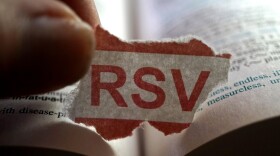Nate Walpole steadied his hand, readied his needle and issued a friendly warning.
“Sir, big poke!” Walpole said, holding the syringe in place for a few seconds before quickly pulling it out and tapping it on a nearby table, protective plastic flipped up over the needle.
On this particular day, the syringe contains only saline, injected into a pillow held in place on a classmate’s shoulder. But soon, it will be the real deal: the COVID-19 vaccine.
As the pandemic continues to stretch doctors, nurses and pharmacists thin, a December order from the state Department of Public Health expanded the pool of medical workers eligible to administer COVID-19 vaccinations.
The order allows qualified EMTs, dental workers, veterinarians and podiatrists to give the shots.
But before volunteers can do that, they need to complete an online class, which details the basics of the vaccine. There’s also brief in-person training, which covers how to draw doses from vials and reviews how to properly inject those doses into shoulder muscles through hands-on instruction.
Instructor Jill Fitzgerald, who teaches at the UConn School of Pharmacy, offered encouragement to students as they worked -- and a warning once they’re done.
“I will tell you, that this is a very emotional thing to get your first vaccine. Some people actually cry,” Fitzgerald said.
Walpole looked up and then readied his next practice shot over that small pillow.
“They’re so happy and relieved they’re getting their vaccine,” Fitzgerald said. “Be prepared for that.”
After the class concluded, Fitzgerald said that training more people to give COVID shots should help expedite vaccine delivery and, hopefully, relieve some stress on the health care system.
“At this point in the pandemic, the pharmacists that are out in the community are pretty tired,” Fitzgerald said. “They’re really looking for some people to step in and assist them in these clinics.”
Walpole, who is with Meriden’s fire department, said he is “just trying to help out.”
“As the vaccine rollout happens, [I] just want to help facilitate that,” he said.
As of Jan. 28, the state DPH says 740 people completed both sections of the training required to make them authorized vaccinators under the new order.
“This number includes 153 dentists, 130 dental hygienists, 24 advanced EMTs, 250 EMTs, 158 paramedics, 5 podiatrists and 18 veterinarians,” wrote DPH spokesperson Maura Fitzgerald in an email sent Friday morning.
“We expect to need to be able to administer 200,000 doses per week by March,” Fitzgerald said. “Assuming a vaccinator can administer vaccine to one patient every 10 minutes and works 8 hours and 5 days, that would imply roughly 800-850 full time vaccinators.”
Fitzgerald said the DPH has thousands of additional pharmacists, nurses and physicians who are already authorized to administer the shots. But many of those professionals are tasked with other obligations as the state responds to the ongoing public health crisis.
“We believe that we have enough through our existing workforce and the new vaccinators that are coming online to meet that demand,” Fitzgerald wrote.
Kenneth Browne, an EMT from Hebron, said he attended the class because he wants to help get the COVID-19 vaccine into as many arms as possible.
“Based on the amount of vaccine that I heard had to be administered on a daily basis in the United States alone, it seemed obvious that we needed to get a tremendous number of vaccinators out there to even come close to those numbers,” Browne said.
But it’s not just qualified vaccinators who are needed at COVID vaccine clinics, says Mai Vestergaard, a pharmacy student at UConn who helped Fitzgerald teach the class.
“There’s many opportunities for nonmedical professionals to volunteer at these clinics, too,” Vestergaard said. “At my clinics, there’s been someone who’s been responsible for registration and documenting and that’s a wonderful opportunity for nonmedical professionals to step up.”
Both medical professional and nonmedical volunteers interested in helping out at vaccine clinics can sign up or learn more at CTResponds.
Fitzgerald said UConn will continue to train qualified vaccinators over the coming weeks.
“The more that we get the word out, the better off we’re going to be,” Fitzgerald said. “We were busy, but not totally busy. We definitely have spaces available for training.”





